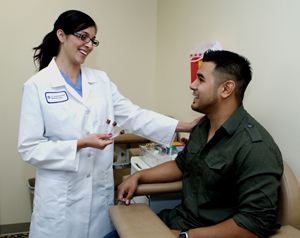
We have talked about acquiring hematology analyzers and chemistry analyzers; now on to the subject of immunochemistry analyzers. Immunochemistry analyzers analyze substances using technology sensitive enough to measure very small quantities accurately. They do this using a technology which involves antigen and antibody reactions rather than the usual chemistry methods—ergo the name “immunochemistry”.
What does an immunochemistry analyzer measure?
The substances most frequently measured by immunochemistry methods in a physician office lab are:
- hormones (e.g. TSH and quantitative HCG)
- tumor markers (such as PSA and CA 125)
- vitamins
While substances measured by ordinary chemistry methods are reported in mg/dl or μg/dl, the hormones and markers measured by immunochemistry methods can be reported in quantities as low as ng/ml or pg/ml—magnitudes smaller volumes than routine chemistry measurements.
The antigen-antibody reaction methods of immunochemistry enable sensitivity and specificity great enough to allow accurate results in these very small volumes. Although there are a few examples of chemistry analyzers that incorporate a module to do immunochemistry testing, most chemistry analyzers cannot achieve the sensitivity and specificity needed for measuring in these very low ranges so a separate analyzer is required.
Why have an immunochemistry analyzer?
The primary reason, of course, would be that having the results it can produce benefits the provider in care of the patient. Without meeting medical necessity, no analyzer is justifiable in the POL, but there are few medical specialties that don’t utilize thyroid testing at some level—TSH is a widely run test—or order PSA on their male patients yearly. Vitamin D seems to be the “test de jour” lately, so there is a real push to add that testing capability to existing labs. An added bonus is that the immunochemistry tests reimburse (if medical necessity requirements are met) at a high level, so they are a source of added revenue to the practice. TSH reimburses close to $25/test and Vitamin D at $43/test on the Medicare Fee Schedule.
What do immunochemistry analyzers cost?
There are many varieties of immunochemistry analyzers available, including several benchtop models, and two popular and easy to operate small analyzers that would fit in a practice having only one or two providers. There are reagent rental agreements with some analyzers that allow for the analyzer to be placed in the lab if reagents and supplies are purchased at a committed volume without ever leasing or purchasing the analyzer itself. Prices for purchase or lease start at about $18K and go on up to 6 figures. The smaller analyzers are simple and easy enough to use that formal laboratory training is not needed, so they lend themselves well to Physician Office Laboratory (POL) applications.
Do all medical practices need a laboratory?
Having an in-office laboratory is frequently a desirable plan for a medical practice. Patient satisfaction is increased when they patients have “one-stop shopping” and don’t have to go somewhere else for their lab tests. Providers like the ability to get STAT results when they are needed and while the patient is still in the office. Being able to control both the sample and the testing, when done properly, increases the reliability of the test results.
Most POLs start with hematology testing (see my article here) —it is a very helpful adjunct to patient care and almost always generates a positive margin. Once the need for hematology has been established, the next step is usually to evaluate the need for in-house chemistry testing (see my article here). Chemistry testing doesn’t produce the same percentage of positive margin that hematology does, though, so the addition of immunochemistry testing should be considered along with routine chemistry testing. It does produce revenue sufficient to help support the laboratory when the profit from chemistry testing is limited.
As with the purchase/lease of any other capital item, a careful pro forma should be done before making a commitment to obtain any analyzer. It is critical that a practice have reliable test counts before doing the pro forma. Once that information is obtained, the instrument sales rep can develop a proposal for any instrument under consideration that includes both reagent and consumables costs in addition to the cost of the instrument itself. While reagent rental agreements allow for the addition of instruments that might not otherwise be available to a small practice, be wary of them. Understand that the price being paid per test usually includes the cost of the instrument and service spread out over the reagent volume commitment, but at the end of the term of the agreement, no ownership of the instrument exists, so never renew a reagent rental agreement without having the cost/test structure in the agreement revised to reflect that the instrument cost has already been covered.
 Consultant Elizabeth “Libby” Knollmeyer, B.S., MT (ASCP) has over 40 years experience in the laboratory industry and has set up many laboratories! She specializes in financial, operational management and compliance issues for both hospital and physician office laboratories. Libby has a wide variety of experience with her areas of special expertise including financial review and management, Quality Management protocols, outreach development, compliance and regulatory assistance, lab design and up fitting, lab remodeling, and market research for IVD manufacturers. She works independently and with large consulting groups to provide interim management for hospitals, and serves as adviser to lab equipment and supply distributors. She consults (and enjoys traveling) throughout the US and internationally. She can be reached at (336) 288-5823 or at eknollmeyer@triad.rr.com.
Consultant Elizabeth “Libby” Knollmeyer, B.S., MT (ASCP) has over 40 years experience in the laboratory industry and has set up many laboratories! She specializes in financial, operational management and compliance issues for both hospital and physician office laboratories. Libby has a wide variety of experience with her areas of special expertise including financial review and management, Quality Management protocols, outreach development, compliance and regulatory assistance, lab design and up fitting, lab remodeling, and market research for IVD manufacturers. She works independently and with large consulting groups to provide interim management for hospitals, and serves as adviser to lab equipment and supply distributors. She consults (and enjoys traveling) throughout the US and internationally. She can be reached at (336) 288-5823 or at eknollmeyer@triad.rr.com.

